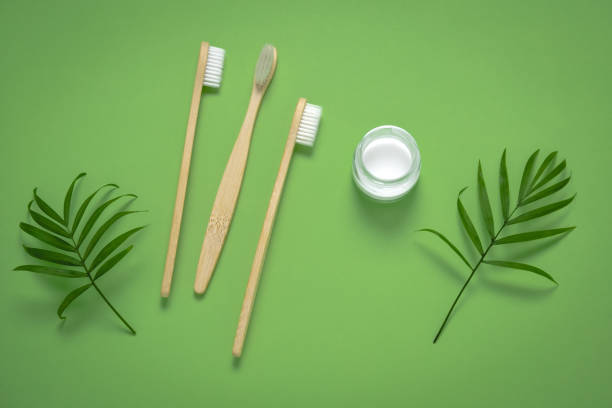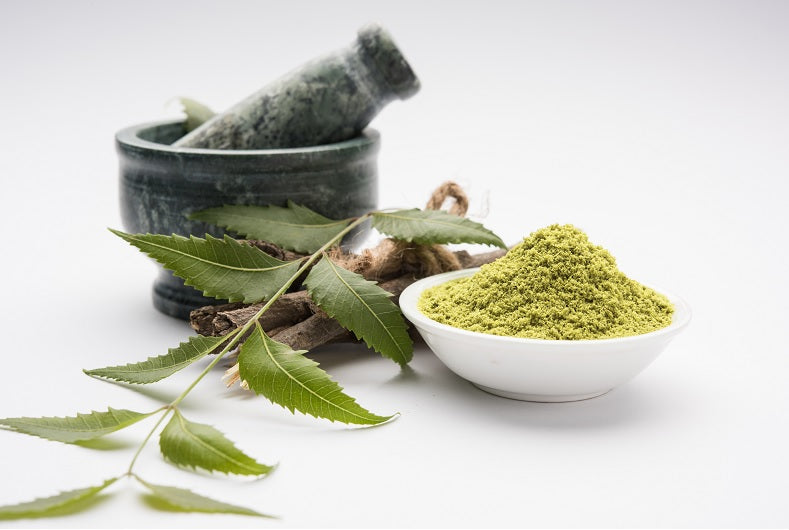
Kids and Ayurvedic Toothpaste: Is It Safe and Effective?
01 Oct, 2025Modern parents are becoming increasingly conscious about what goes into their children’s daily ro...
Read more
Modern parents are becoming increasingly conscious about what goes into their children’s daily routine, including their toothpaste. With concerns about chemicals, fluoride, and artificial additives in conventional kids’ pastes, Ayurvedic toothpaste is gaining popularity as a safer, more holistic choice. Rooted in the wisdom of Ayurveda, these herbal blends use natural ingredients like neem, licorice, amla, and clove to protect children’s teeth and gums without exposing them to harmful chemicals.
This guide explores everything parents need to know about Ayurvedic oral care for kids, from safety to benefits, comparisons with regular toothpaste, and tips for building a healthy brushing routine.
Generally, Ayurvedic toothpastes are considered safe and even beneficial for children above 5-6 years of age.
Free of harmful ingredients, including triclosan, SLS, parabens, artificial sweeteners, and fluoride (harmful in excess), Ayurvedic toothpastes contain healing herbs with time-tested antimicrobial and strengthening properties.
If swallowed (as children are apt to do), ingredients such as fluoride in regular toothpastes are likely to be harmful. Since Ayurvedic toothpastes contain gentle herbs such as Licorice, Fennel, Babool, and Amla, no harm is done if the toothpaste is accidentally swallowed. Other than being safe, these herbs support gum and enamel health.

No harsh chemicals or synthetic foaming agents
Safe for delicate milk teeth and gums
Naturally sweet or mild in taste (child-friendly herbs like fennel or licorice)
Supportive of the oral microbiome
Under 18 months: Avoid using any toothpaste. Instead, gently massage gums with a clean finger and natural oils like coconut oil or ghee, or wipe with a soft cloth after feeding.
18 months to 5 years: Stick to plain water brushing or gentle gum cleaning. At this stage, children may not consistently spit out paste, so it’s best to avoid toothpaste, even mild herbal ones, unless recommended by a pediatric dentist.
5 years and above: This is the safest age to begin using Ayurvedic toothpaste regularly. By this age, children can reliably spit out the paste, making it safer to introduce a pea-sized amount of mild, fluoride-free herbal toothpaste. Choose kid-friendly formulations with gentle herbs like fennel, licorice, or babool for an easy transition, Maharishi Ayurveda Ayurvedic Toothpaste which is completely chemical-free.
Note: While some experts say that under supervision, it is safe to introduce Ayurvedic toothpastes into brushing routines at 2 years of age, 5 years is generally considered a safe age to start your child on his or her Ayurvedic dental care routine.
|
Feature |
Ayurvedic Toothpaste |
Conventional Kids’ Toothpaste |
|
Fluoride |
No fluoride – herbs like neem, triphala, and amla offer natural cavity protection |
Often contains fluoride as the main anti-cavity agent |
|
Synthetic Flavors |
Free from artificial sweeteners and flavors – uses mild herbs like fennel or licorice |
Frequently includes artificial flavors and sweeteners |
|
Herbal Actives |
Enriched with natural actives (e.g., neem, clove, babool, miswak) |
Rarely uses herbal ingredients |
|
Safety if Swallowed |
Safe in small amounts since chemical-free |
Varies – swallowing fluoride or chemicals may be a concern |
|
Gum & Enamel Support |
Strengthens gums, supports enamel, balances oral pH naturally over time |
Limited long-term gum and enamel benefits |
Is antibacterial, anti-caries, and plaque-preventive. The bioactive compounds in the herb, including azadirachtin and nimbidin, fight cavity-causing bacteria such as Streptococcus mutans. The herb also helps reduce plaque formation and supports long-term oral hygiene. Regular use of a toothpaste with Neem may naturally soothe gum inflammation and prevent bad breath.
It is naturally sweet, soothes gums and reduces irritation. The herb contains glycyrrhizin and licoricidin, both inhibit cavity-causing bacteria. The mild taste of the herb with its sweet undertones makes toothpastes with Mulethi a sure-shot favourite with children.
Strengthens teeth and prevents plaque buildup. Its astringent properties are known to tighten gums and reduce bleeding. Traditionally used as a chewing stick (datun), Babool is believed to protect enamel and support gum immunity in growing children.
It is packed with Vitamin C and boosts gum health. It enhances collagen synthesis, which is crucial for strengthening connective tissues and gums. The antioxidant properties of Amla help reduce oxidative stress, inflammation, and tackle early signs of gum sensitivity.
Freshens breath, acts as a mild antimicrobial, and provides digestive support.
It has a pleasing flavour and sweetish taste, enjoyed by children. Fennel is also a mild herb, great for children who may have high oral sensitivity.
Has a sharp, strong impact but since it is antimicrobial, pain-relieving and anti-inflammatory, a small amount in children’s toothpaste is beneficial. The presence of eugenol (a natural aromatic compound) in Clove helps reduce toothache and fights bacterial growth. The herb may be particularly helpful during teething years to ease gum irritation and prevent infections.
A formulation of three potent herbs is antioxidant and antimicrobial. Other benefits include gum-strengthening, promoting salivary defences, and preventing cavities. The unique mix of herbs helps balance the oral microbiota by reducing the growth of harmful bacteria.
Strengthens enamel, balances oral pH and prevents decay. The herb contains natural fluoride, silica, and vitamin C, which help reduce bacterial growth while brightening and polishing teeth. Traditionally, Miswak twigs are used as a natural toothbrush (datun), and is a gentle way to cleanse young teeth.
Herbal flavours may require some getting used to. Here are ways to get your child started on the journey of natural oral care.
Get a soft-bristled toothbrush and start your child with a small amount, maybe mixed with coconut oil or any edible oil your child is familiar with.
Choose a toothpaste that contains mild Ayurvedic herbs such as fennel or cardamom.
Make brushing routines fun - get a toothbrush designed after his or her favourite cartoon character, make a particular song the ‘brushing-time’ background music - anything to make the activity a fun thing to do, not a boring chore.
Remember to persist for 1-2 weeks at a stretch, twice daily - taste aversion is likely to fade and the use of the toothpaste will become a habit.
Set an example – shift to an Ayurvedic toothpaste for the entire family’s brushing routine.
Get your child to combine tongue-cleaning and rinsing for complete oral hygiene. (Make this interesting – perhaps by switching off the music and singing a ‘finale’ yourself as he/she finishes off the process.)
Maharishi Ayurdent Toothpaste is one of the finest Ayurvedic toothpastes in India, formulated with authentic herbs from the ancient Ayurvedic tradition. However, the Classic variant may be too strong for very young children.
For children over 2 years old, use a pea-sized amount.
If the child finds it too strong, start with Ayurdent Mild, designed for sensitive gums and children.
Stronger gums & enamel from herbs like neem, babool, and triphala
Natural cavity protection without fluoride or synthetic chemicals
Fresh breath & oral cleanliness with antimicrobial herbs
Balanced oral pH & microbiome, preventing long-term decay
Gentle care for sensitive gums and growing teeth
1. Will it be too spicy or bitter?
Not all are strong-tasting; mild variants with fennel or licorice are perfect for kids.
2. Is it okay if my child swallows a little?
Yes, safe in small amounts since they are free from fluoride and harsh chemicals.
3. Will it clean teeth effectively without fluoride?
Yes, herbs like neem, triphala, and amalaki protect teeth and gums naturally with regular brushing.
4. It doesn’t foam, will it still work?
Yes, foaming isn’t linked to cleaning. Herbal pastes clean through antimicrobial and strengthening herbs.
5. Are there any side effects?
Minimal, if you choose certified, chemical-free brands. Always check labels for authenticity.
Use a soft-bristled toothbrush and a pea-sized amount.
Brush twice daily, especially before bedtime.
Encourage brushing through stories, songs, or reward systems.
Lead by example, children copy their parents’ habits.
Combine with tongue cleaning and rinsing for complete oral hygiene.
Introducing Ayurvedic toothpaste into your child’s routine is one of the simplest ways to ensure safe, effective, and chemical-free oral hygiene. With natural herbs like neem, amla, licorice, babool, and clove, these formulations protect against cavities, strengthen gums, and promote lifelong healthy habits.
For parents seeking a trusted choice, Maharishi Ayurdent Toothpaste stands out as one of the best Ayurvedic toothpastes in India, offering both Classic and Mild variants suitable for children.
Start early, stay consistent, and give your child the gift of Ayurvedic oral care—naturally strong teeth and healthy gums, for life.
For babies under 2, it’s best to avoid toothpaste altogether. At this age, gentle gum massage with a clean finger and oils like ghee or coconut oil, or wiping teeth with a soft cloth, is usually recommended. Once your child is around 18–24 months old and can spit reliably, you may introduce a pea-sized amount of mild, fluoride-free Ayurvedic toothpaste under supervision. Always choose formulations with gentle herbs such as fennel, licorice, or babool that are safe if swallowed in small amounts.
Children with sensitive gums or early signs of discomfort benefit from mild, non-foaming Ayurvedic toothpastes. Herbs like licorice, amla, and babool provide natural soothing and strengthening without the harsh chemicals or abrasives found in some conventional pastes. Look for products labeled SLS-free and chemical-free to minimize irritation. If sensitivity persists, consult a pediatric dentist to rule out underlying issues.
Alternating between Ayurvedic and regular toothpaste is not necessary. A well-formulated Ayurvedic toothpaste already provides cavity protection, gum strength, and fresh breath without fluoride, triclosan, or synthetic flavors. Consistency is key for children’s oral health, so it’s better to stick to one safe, gentle herbal toothpaste rather than switching back and forth.
Modern parents are becoming increasingly conscious about what goes into their children’s daily ro...
Read moreAyurvedic toothpaste often tastes strong, bitter, or spicy due to herbs like neem, clove, babool,...
Read moreWhen it comes to oral health, most people reach for modern fluoride toothpastes. But did you know...
Read moreUnderstanding Ayurvedic Oral Care Imagine a time when dental care was not just about brushing ...
Read more Guide to Immunity
Guide to Immunity

Modern parents are becoming increasingly conscious about what goes into their children’s daily ro...
Read more
Ayurvedic toothpaste often tastes strong, bitter, or spicy due to herbs like neem, clove, babool,...
Read more Featured Articles
Featured Articles

Are you struggling with your oral health because of your eating habits? Are toothaches becoming your new normal because you have not been brushing well? Is eating ice cream a big NO, as you have brushed a little too much? A lot of you have been made to believe that your oral issues emanate from what you are doing wrong or not doing the right thing. What if we tell you that you have been approaching this all wrong and trying to solve the problems topically instead of addressing the root cause? Do you ever think about the real reason for these significant dental issues?
Ayurveda helps you focus on the fundamentals and identify the root cause. It is the science of treating the underlying imbalances and correcting the cause in a completely natural and effective way. Among its numerous health benefits, when it comes to oral health, Ayurvedic Toothpaste is a game-changer for preserving strong and healthy teeth. A natural and effective alternative to the chemical-laden equivalents and a beneficial synergy of herbs that help in holistic dental care. Surprising, right!? Well, read on to turn your surprise into a new belief!


नित्यमध्मान तां तांस्तु व्याधिभिश्च विवर्जितः।
रसैश्च दन्तमूलानां रूक्षैराचाम्य विक्रियाम्॥
Meaning: Regularly cleaning your mouth makes your teeth and gums healthy and prevents diseases.
The Charaka Samhita mentions the importance of oral care in overall health. This is more than just information from ancient scriptures; much research has validated the role of a healthy mouth in a healthy body. A 2022 study in Frontiers of Microbiology highlighted this critical link: an imbalance in the oral microbiome causes periodontal disease and promotes cardiovascular disease development.
Wondering how? Saliva is the first fluid that is secreted during digestion. It lubricates the tongue and oral cavity and ensures that the whole digestive tract stays lubricated, along with the chewed food passed down to the stomach. It carries all microbes into your gut and is the most crucial link between oral and overall health
Saliva also contains some antimicrobial proteins and enzymes that keep harmful microorganisms from growing while ensuring the good ones thrive. However, any saliva production or composition imbalance can affect the oral microbiota. This could be due to poor oral hygiene, an unhealthy diet, or systemic health issues.
This imbalance can have dire consequences for oral health, such as dental caries, gum issues, and infections. Moreover, balanced saliva helps lubricate and break down food for easy digestion and ensures that teeth get essential minerals to maintain and repair themselves.

Dantadhaawan is an ancient Ayurvedic oral hygiene practice that involves using herbal twigs, AKA ‘‘Datoon’’, to clean teeth and gums. Commonly used twigs include those from the neem, babool, and liquorice plants. These twigs have antimicrobial properties that help maintain oral hygiene.
According to the Shadrasa (six tastes) in Ayurveda, every herb has a Rasa (dominant taste) that determines its properties and actions.
An ideal toothpaste must contain Katu, Tikta, Kashaya, and Madhura Rasa, each of which positively impacts maintaining the health of our oral cavity.
Let’s uncover the properties of these essential Rasas to know more:
|
Rasa |
Action |
|
Katu (Pungent) |
It deeply cleanses the oral cavity |
|
Tikta (Bitter) |
Antibacterial & antiseptic action |
|
Kashaya (Astringent) |
Provides pain relief |
|
Madhura (Sweet) |
Strengthens the gums & teeth |
You see, an Ayurvedic toothpaste not only cleanses your teeth but also gives Bala (strength) through the properties of the natural Dravyas (herbs) used in it.

It may sound complex, but formulating toothpaste at home is as easy as making a face pack! All you need is 10 grams of dry leaves or powders of neem, mulethi, jamun, and amalaki. Grind or mix them, and your dry toothpaste powder is ready! During every brushing session (preferably morning and evening), mix it with your *Dosha-appropriate adjuvants. Vata *Dosha* can mix sesame oil, Pitta *Dosha* can mix ghee, and Kapha *Dosha* can mix honey/mustard oil, and your quick, healthy toothpaste is ready!
If you’re a busy bee, not interested in DIYs, or find it difficult to source these ingredients, don’t worry! We have Maharishi Ayurveda Ayurdent Toothpaste. It is your one-stop solution to all your oral problems. It’s a unique formulation that works on your saliva and is suitable for all body types, irrespective of the Doshic predominance.
It contains neem for cleansing, triphala for balancing, and meswak & ginger for stimulating saliva. Ayurdent promotes holistic oral health naturally and provides protection from major oral problems like cavities, plaque, bleeding gums, toothache, sensitivity, and bad breath. It contains the goodness of 20 Ayurvedic ingredients and is free from SLS and fluoride. Certified by COSMOS Natural, it stands out for its authenticity compared to other Ayurvedic and herbal toothpaste. This innovative, non-foaming formula is a must-try in the category.
 Recent Blogs
Recent Blogs


As per Ayurveda, no two individuals are alike. Maharishi Ayurveda offers personalised treatment for each individual at all touch-points. Consult our expert Vaidyas to get root cause-based personalised treatment from the comfort of your home
CONSULT VAIDYA


